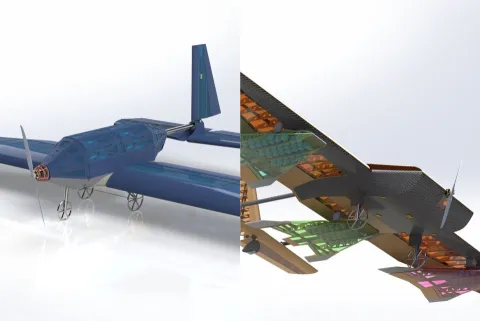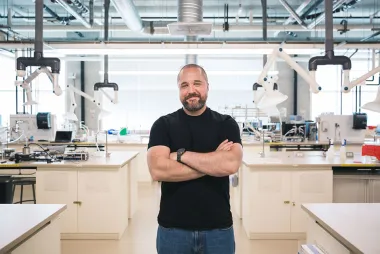UBC AeroDesign place first at international SAE Aero Design competition

An aircraft design created by UBC AeroDesign has placed first in the Regular Class category of the 2021 SAE Aero Design competition, the world's premier intercollegiate aircraft design competition. This year's event featured teams from countries such as the United States, Brazil, India, Mexico and China.
The UBC team placed fifth for its technical presentation of the design in the same competition class, which required participants to create "a bush plane to deliver outsized spherical cargo as well as regular boxed cargo, while using short runways."
In the Advanced Class of the competition, where teams were tasked with designing both a primary aircraft and a small autonomous glider to deliver colonists, supplies and habitats to a new planet, UBC AeroDesign took second place and ninth place in the design report and technical presentation categories, respectively.
“Despite a virtual competition this year, we've been able to successfully go through the full design cycle of an aircraft with the team and provide a welcoming community to all our new members,” said team captain and third-year mechanical engineering student Phoebe Cheung. “We are incredibly proud of our two designs this year.”
The SAE Aero Design competition seeks “to provide students with real-world engineering experience” by challenging them to design lightweight yet reliable aircraft that are optimized for payload and propulsion efficiency. In addition, the competition supports the development of written and oral communication skills, scoring teams not only on their design report, but also the quality of their presentation of those designs.
The annual event features three classes of competition: Regular, Advanced and Micro. The Regular Class aims to provide students with a fundamental understanding of flight, while the Advanced Class — whose goal is "autonomous flight with a purpose" — "requires teams to have a systems approach to the design while integrating several engineering disciplines: aeronautical, mechanical, electrical, and computer engineers."
The Micro Class, which the UBC team did not participate in, requires competitors "to make trades between two potentially conflicting requirements, carrying the highest payload fraction possible, while simultaneously pursuing the lowest empty weight possible."
“We are very grateful for the support of our faculty advisor, Dr. Carl Ollivier-Gooch, and UBC Applied Science over the years,” said Cheung, “and we're looking forward to returning to more on-campus activities to get ready for the 2022 competition season!”


